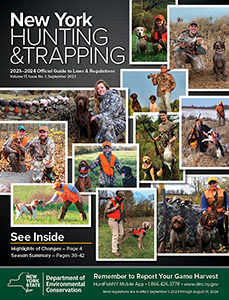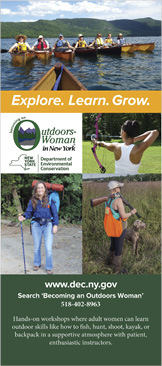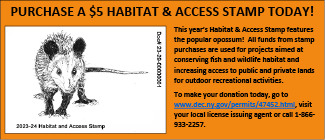NYS Department of Environmental Conservation
New York State
Kathy C. Hochul, Governor
NYS Department of Environmental Conservation
Basil Seggos, Commissioner
Katherine Petronis, Deputy Commissioner for Natural Resources
Jackie Lendrum, Director, Division of Fish and Wildlife
James Farquhar, Chief, Bureau of Wildlife
Jeremy Hurst, Section Head, Game Management
Katherine Jones, Guide Editor
How to contact us:
NYS Department of Environmental Conservation
Game Management Section
625 Broadway
Albany, NY 12233-4754
Website: www.dec.ny.gov
Division of Fish and Wildlife's Mission:
The mission of DEC’s Division of Fish and Wildlife is to serve the interests of current and future generations of New Yorkers by using our collective skills, in partnership with the public, to describe, understand, manage, and perpetuate a healthy and diverse assemblage of fish, wildlife, and ecosystems.
This guide is a summary that is intended for convenience only. For complete references, consult the New York State Environmental Conservation Law and Volume 6 of the Codes, Rules and Regulations of New York State. These are available at:
www.dec.ny.gov/regulations/regulations.html
www.assembly.state.ny.us/leg/ (Environmental Conservation Law)
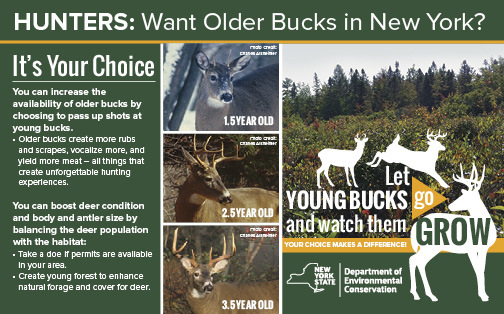
Report Your Moose Sightings
Moose are protected in New York and cannot be hunted. DEC and its research partners are working to understand the status of the moose population. You can help us by reporting moose sightings at www.dec.ny.gov/animals/6964.html.
Hunters: You Can Help Combat the Illegal Wildlife Trade
One of the biggest threats to New York’s turtles is illegal collection. What to look for: people with bags poking around wetlands and streams; unmarked traps in wetlands (a trap set for legitimate purposes will be clearly labeled); sheets of metal/plywood laid out on the ground to attract reptiles; cars with collection equipment like nets, containers, pillowcases visible inside; unattended backpacks/bags left in the woods along a trail or road. If you see or hear about suspicious behavior that may be connected to poaching call DEC Law Enforcement - 1-844-DEC-ECOS. The U.S. Fish and Wildlife Service (USFWS) also has an anonymous tip line - 1-844-FWS-TIPS. For more visit: www.fws.gov/story/how-report-wildlife-crime.
Hunter Education: Next Step Courses
The DEC’s Hunter Education Program (HEP) is now offering Next Step courses for people who have already completed a hunter education, bowhunter education, or trapper education certification course and want more education and hands-on experience.
- Taught by HEP staff and certified HEP instructors.
- 4-Hour courses focus on safety, techniques and hands-on experience in:
- rifle, shotgun, crossbow, archery, fur handling, land trapping, and water trapping.
All Next Step Courses are FREE
- Registration with your certificate number is required.
- Minimum age is 12 years old.
- No certification is offered in these courses.
For more information and to register, visit www.dec.ny.gov/outdoor/92267.html or scan the QR code.
Eurasian Boar
Eurasian boars are a destructive invasive species that damage habitat and crops, and threaten native wildlife and domestic livestock. DEC and USDA have worked hard to eradicate these animals from the state’s landscape. We are now working to prevent their reintroduction into New York.
- It is illegal to possess, sell, distribute, trade, or transport Eurasian boars or their hybrids.
- It is illegal to import, breed, or release Eurasian boars or their hybrids.
- It is illegal to hunt, trap, or take free-ranging Eurasian boar or their hybrids.
Although DEC’s eradication efforts have been very successful to date, we must remain vigilant. Anyone who sees a Eurasian boar should report it to DEC as soon as possible by emailing [email protected] or calling 518-402-8883.
Where does DEC stock pheasants?
In 2022, DEC launched an interactive mapper that shows where pheasants are released throughout New York. Please note that many of these lands are privately owned and pheasant stocking is only permitted with the participation of landowners. Be sure to respect the land and any special rules that may be in place. To view the map, visit: www.dec.ny.gov/outdoor/8363.html
Report Your Furbearer Sightings!
DEC wants to learn more about the occurrence of various furbearers throughout New York such as bobcat, otter, fisher, weasel, and snowshoe hare. Your observations help biologists understand the distribution and abundance of these elusive or inconspicuous mammals.
You can report your observations online, and you can even include photos!
Go to www.dec.ny.gov/animals/30770.html or email us at [email protected]!
Thanks for your help!
Attention Boaters!
Before you launch your boat or leave a site, you are required to clean all visible plant and animal material from your boat, trailer, and associated equipment. Drain your boat’s bilge, livewell, baitwell, and other water-holding compartments. For more information on aquatic invasive species, visit: www.dec.ny.gov/animals/50121.html.
Brianna’s Law – New Boating Safety Law!
If you were born on or after: |
You will need a boating safety certificate when operating a motorized vessel in: |
January 1, 1993 |
2020 |
January 1, 1988 |
2022 |
January 1, 1983 |
2023 |
January 1, 1978 |
2024 |
All operators of motorized vessels, regardless of age, will need a boating safety certificate by January 1, 2025. For more information and to find courses: parks.ny.gov/recreation/boating/.

Permit Requirements for Marten
A free special permit is still required to trap marten in New York. To receive a permit, contact the DEC Region 5 Wildlife Office in Warrensburg at 518-623-1240. You must provide the following information:
- Name
- Mailing address
- DEC ID # (from your trapping license or backtag)
- Phone number or email address.
You can also apply by email to: [email protected], type “Marten Permit” in the subject line. Please be sure to include the information listed above.
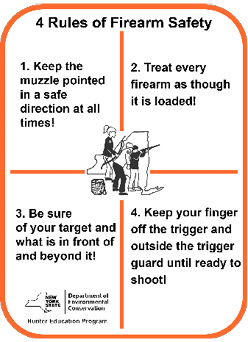
DMAP on State Lands
DEC has enrolled several state lands in DMAP. Tag availability is limited and hunters must apply to participate. See www.dec.ny.gov/outdoor/121387.html for information. Properties include:
- Bully Hill State Forest, WMU 9P
- Doodletown Wildlife Management Area, WMU 4Z

Adopt Trapping Best Management Practices (BMPs)
- Learn practical traps and techniques that improve efficiency, selectivity, and the welfare of trapped animals
- Find out about specifications for traps that meet BMP criteria for each species
- Instill public confidence in and maintain public support for trapping
Visit www.dec.ny.gov and search “Trapping BMPs”

